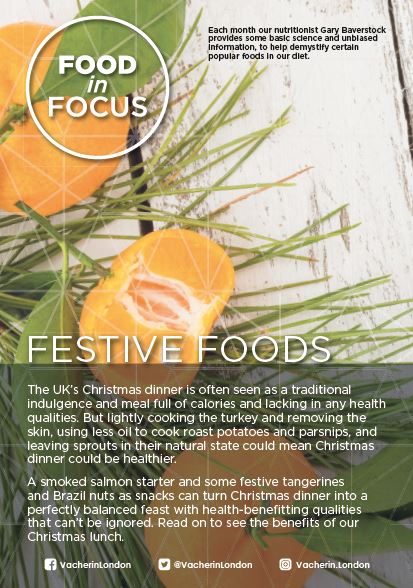
 The UK’s Christmas dinner is often seen as a traditional indulgence and meal full of calories and lacking in any health qualities. But lightly cooking the turkey and removing the skin, using less oil to cook roast potatoes and parsnips, and leaving sprouts in their natural state could mean Christmas dinner could be healthier.
The UK’s Christmas dinner is often seen as a traditional indulgence and meal full of calories and lacking in any health qualities. But lightly cooking the turkey and removing the skin, using less oil to cook roast potatoes and parsnips, and leaving sprouts in their natural state could mean Christmas dinner could be healthier.
A smoked salmon starter and some festive tangerines and Brazil nuts as snacks can turn Christmas dinner into a perfectly balanced feast with health-benefitting qualities that can’t be ignored.
BENEFICIAL FESTIVE FOODS
Smoked salmon
An excellent source of vitamins B12, D, essential omega fats, selenium and a good source of complete protein, phosphorus, and vitamins B3, B6, B5, choline, biotin and potassium.
These nutrients help support blood cells, energy, growth, repair, immunity, liver, nerve and brain function, thyroid, bone and cardiovascular health.
Turkey
A very rich source of complete protein, vitamin B2, B6 B12, zinc, selenium - essential component required for thyroid hormone metabolism,
antioxidant defence systems and immune function.
It contains tryptophan, which produces serotonin, a neurotransmitter that helps improve your mood.
Parsnips
An excellent source of soluble and insoluble dietary fibre and is rich in B1, B5, B6, B9, vitamins E and
K and it has good levels of iron, calcium, copper, potassium, manganese and phosphorus.
It is a good source of vitamin-C that helps to maintain healthy connective tissue, teeth and gums.
Sprouts
Are especially rich in vitamin K - for blood clotting and bone health and high in vitamin C - helps iron absorption and is involved in tissue repair and immune function.
Their high fibre content helps support regularity and gut health.
Brazil nuts
Contain vitamin E and the antioxidant selenium (1-2 nuts a day = RDA) and a great source of all B vitamins, important for red blood cell production.
They have good levels of copper, magnesium, manganese, potassium, calcium, iron, phosphorus, and zinc.
Tangerines
Are rich sources of soluble dietary fibre, pectin that protects the colon from toxic substances and also reduces cholesterol levels.
Oranges are an excellent source of Vitamin C and a very good source of B1, B6 and B9 and minerals like potassium and calcium.
Cranberries
Cranberry may protect against bacterial infections such as E.coli in the urinary system.
Cranberries turn urine acidic that, with inhibition of bacterial adhesion actions, it can help prevent the formation of alkaline stones inside the urinary tract.